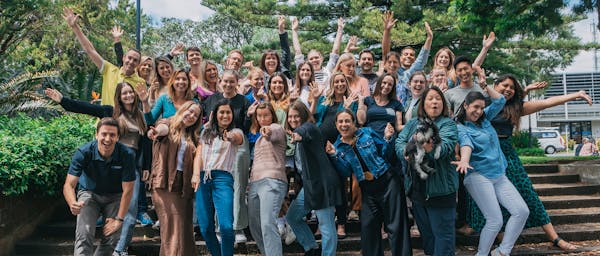Experiencing a new culture and seeing a completely different part of the world, whilst being able to help at the school. The teachers were extremely welcoming, and I will be back. The kids are so eager to learn, and I made lots of posters for their class, so it is nice to know that even though I have left, I have been able to give them that. Anyone thinking about doing it, I say just go for it. I was incredibly anxious to go away and do that, but the moment I got there, all nerves disappeared. Everyone from the locals, to other volunteers, are amazing, and you will meet so many people from all over the world, and make friends for life.

Rural Teaching Volunteer Program in Zambia - Livingstone
Purpose
Start dates
Duration
Volunteer hours
Age
Accommodation
Who is going?
Group video calls
Once you have secured your place, join regular video calls to meet your Program Manager and other volunteers before your trip.
This program is ideal for:
The rural village setting offers an authentic, off-the-beaten-path experience, perfect for those looking to fully immerse themselves in Zambian culture while making a meaningful impact in local schools.
Project details
Ready to become a volunteer teacher in rural Zambia? International Volunteer HQ’s Rural Teaching project offers an immersive experience where you’ll live in a small Zambian village and support local schools. Volunteers stay with a local family, helping with daily tasks while gaining an authentic, hands-on cultural experience. With understaffed schools in need of extra hands, you’ll assist with a variety of lessons and provide tutoring to students who need it most.
What to expect and how you'll make an impact
If you’re looking for a truly immersive teaching experience in Africa, the Rural Teaching project in Zambia offers a unique opportunity to live and volunteer in a local village while making a meaningful impact on children’s education. Based in the village of Sinde, about 20 km from Livingstone, volunteers become part of the community, experiencing authentic daily life while supporting teachers in local schools.
Depending on their preference and the needs of the community, volunteers can teach at either a pre-school or a primary school. The pre-school, just 400 meters from the host family accommodation, has one classroom with another under construction and serves around 40 children aged 3 to 7, including five with special needs. Volunteers assist with:
- Marking books
- Leading creative activities
- Teaching basic concepts like the alphabet and numbers in English
The primary school, about 2 km away and within walking distance, has approximately 300 students from pre-school to grade 9, aged 4 to 15. Volunteer tasks include:
- Teaching English and Math
- One-on-one tutoring and homework help
- Leading creative activities
- Marking books and conducting reading lessons
- Supervising students during breaks and exams
This project provides an incredible chance to engage with the local culture while contributing to children’s education in a meaningful way.
Why do Rural Teaching volunteering in Livingstone with IVHQ?
When you volunteer to teach in rural Zambia you’ll be adding value to the local community, while also developing personally and professionally by:
- Improving educational outcomes for disadvantaged students
- Helping communities maintain their lifestyle
- Developing your communication skills
- Gaining teaching experience
- Immersing yourself in Zambia’s culture
- Discovering Africa’s incredible wildlife
Volunteer requirements
Volunteers under the age of 16 must be accompanied by a parent or guardian to participate in this program, are required to provide IVHQ with parental consent in order to participate, and may be asked to provide additional documentation to the local team.
Volunteers aged 16 or 17 on their start date, if unable to obtain a criminal background check, can provide two character reference letters instead.
Volunteers aged over 18 on their start date are required to provide a criminal background check to IVHQ before departure.
All volunteers must speak English and have adequate volunteer travel insurance.
Are you eligible to volunteer?
Submit a free application so we can confirm your eligibility and check availability for your preferred dates.
Not sure which program to join?
Get personalized recommendations >
Who is going?
Group video calls
Once you have secured your place, join regular video calls to meet your Program Manager and other volunteers before your trip.
Zambia photo gallery

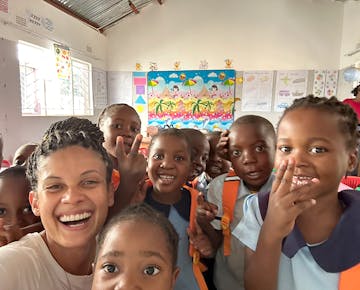
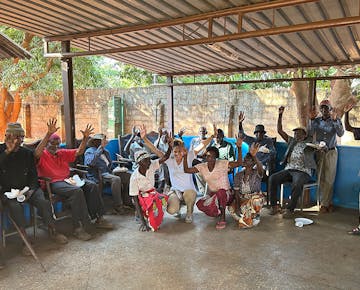

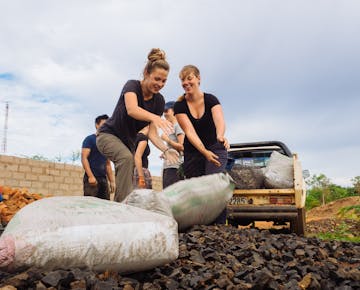
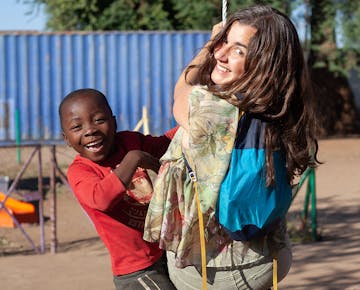

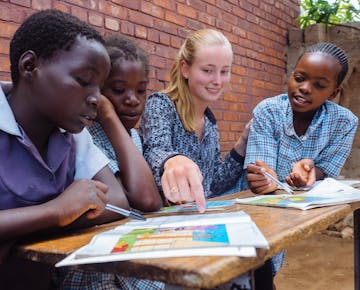

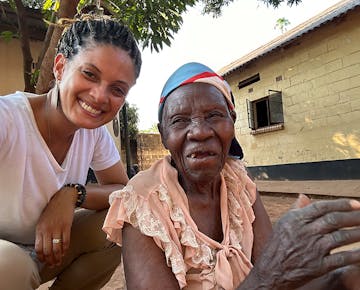
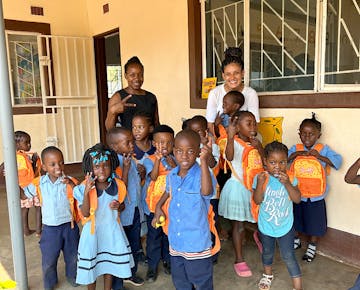
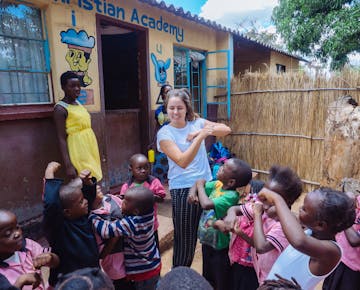
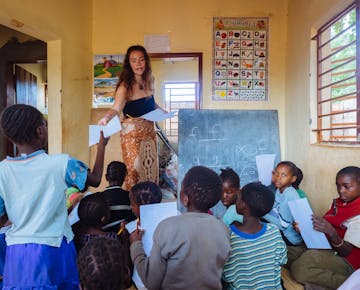

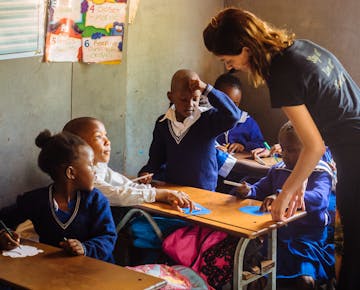
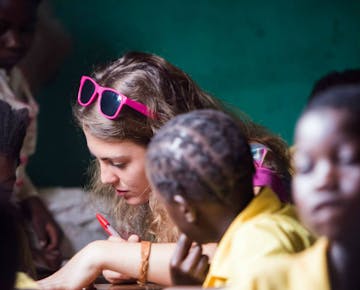

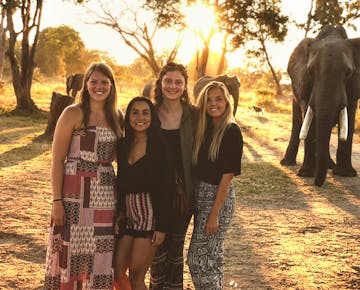
Academic course credit

Academic course credit
Gain course credit from your college or university and meet your academic requirements when completing a volunteer abroad program with International Volunteer HQ!
Learn about course creditRecommended online TEFL course

Recommended online TEFL course
We encourage volunteers on IVHQ’s Teaching and Childcare projects to come prepared by completing some relevant training, such as a Teaching English as a Foreign Language (TEFL) course. Although formal teaching qualifications are not required on these projects as volunteers are supported by local staff, taking a TEFL course enables you to gain more from the experience. Visit our Online TEFL Course page to learn how to gain an internationally recognized TEFL certification at a discounted rate.
Get TEFL certified onlineLocation
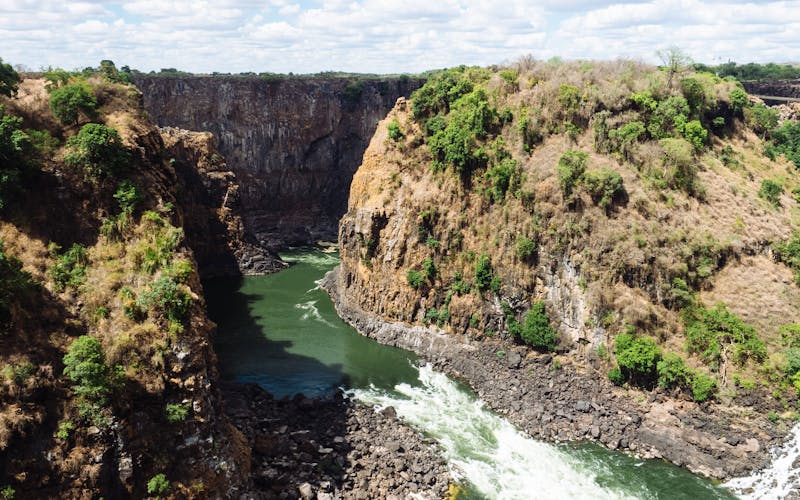
Location
The Rural Teaching project in Zambia is based in the village of Sinde, a small but vibrant rural community approximately 20 km from Livingstone. Nestled along the banks of the Zambezi River, Sinde offers a peaceful and immersive setting where volunteers can experience the simplicity and warmth of village life. The community is made up of traditional mud-brick homes, thatched roofs, and open landscapes, providing a striking contrast to the bustling tourism hub of Livingstone.
Life in Sinde revolves around agriculture, family, and community gatherings. Villagers rely on farming, fishing, and small-scale trade, creating an environment where volunteers can learn about local customs, traditional cooking, and sustainable farming practices. The pace of life is slow and relaxed, offering a refreshing escape from modern distractions. Evenings often bring opportunities to connect with the community through storytelling, cultural dances, and shared meals around the fire.
Arrival and orientation
The program orientation takes place on the first and third Monday of each month, and volunteers should arrive in Livingstone the Sunday before their start date. Once you’ve registered for the program, please book your flights to Harry Mwanga Nkumbula International Airport (LVI) in Livingstone. Your airport pick-up is included in the Program Fee.
Upon arrival, you’ll be welcomed by a member of the local team and taken to the volunteer house in Livingstone, where you’ll be accommodated for your first night. Accommodation is covered by your Program Fee and includes the night before orientation. If you’re traveling in Zambia before your program, we can arrange a pick-up from your hotel in Livingstone the day before orientation.
Orientation, held at the volunteer house, begins on the morning of your start date and includes a tour of Livingstone. During this time, volunteers can buy local SIM cards, purchase data for internet access, and stock up on groceries for their stay. Orientation covers important details about your volunteer experience, including an introduction to Zambia, local culture, rules and expectations, safety guidelines, travel opportunities, and an overview of your project placement. It’s also a great opportunity to meet fellow volunteers and exchange contact information for weekend trips and socializing.
In the late afternoon, volunteers on the Rural Teaching project will be picked up in Livingstone by their host family and transported to Sinde village, where they will stay for the duration of their program, right up until the day before their return flight home (Saturday). Once in Sinde, volunteers will fully immerse themselves in the local community, gaining a deeper understanding of rural life in Zambia while contributing to the education of local children.
Volunteer schedule example
Volunteer schedule example:
First Day:
On your first day of volunteering (Tuesday), you will be escorted to your placement by the local family and introduced to the staff you’ll be working with.
Typical Weekday Schedule:
| 7:00 AM | Breakfast at the homestay. |
| 8:00 AM | Travel to your placement to begin your work. |
| 12:30 PM | Work at your placement concludes, and you return to the homestay for lunch. |
| 1:30 PM | After lunch, you can relax or, if you’re looking for additional activities, assist your host family with tasks around the home. |
| 6:00 PM | Dinner at the homestay. |
Weekends
Volunteers in Zambia have a wide variety of activities to enjoy over the weekend. The region’s main attraction, Victoria Falls, is a UNESCO World Heritage Site and one of the largest waterfalls in the world. Nature enthusiasts can explore nearby national parks and take part in safaris and tours across Zambia, as well as in neighboring countries like Botswana, Zimbabwe, and Namibia. For thrill-seekers, Zambia offers plenty of adrenaline-pumping experiences, including bungee jumping, the Devil’s Pool, white-water rafting, abseiling, gorge swinging, zip-lining, and microlight flights. For those who prefer to stay closer to town, Livingstone has a vibrant selection of restaurants, curio markets, and cultural activities to explore.
Accommodation and WiFi
Livingstone
Volunteers will spend their first and last nights at the volunteer house in Livingstone, ensuring they receive their orientation and are able to catch their flight on their final day. Located just 10 minutes from the town center, the volunteer house offers dormitory-style accommodation. Volunteers will share a bedroom and bathroom with 2 to 5 other volunteers of the same gender. The house is equipped with electricity, running water, and western-style bathrooms, and features a communal lounge and garden area for relaxation and socializing. However, power cuts are common, especially during droughts, which can affect the water supply.
Wi-Fi is not available at the volunteer house, but volunteers can easily access it at nearby cafes and restaurants within walking distance. To stay connected, it’s recommended to bring an unlocked mobile phone and purchase a local SIM card, which the local team will assist with during orientation. If you wish to arrive earlier or stay longer in Livingstone, extra accommodation can be arranged, subject to availability and at an additional cost.
Sinde Village
In Sinde village, volunteers will experience authentic rural life while staying in a basic homestay. Accommodation consists of shared rooms, with 2-3 volunteers per room, separated by gender for privacy and comfort. The accommodation includes dirt floors, bucket showers, an outdoor toilet, and no access to electricity or running water. Wi-Fi is not available in the homestay. Volunteers will help with daily household tasks such as gardening, collecting firewood and water from the well, cooking, and cleaning. Depending on your placement, volunteers will walk either 400 meters to the pre-school or 2 kilometers to the primary school where they’ll be volunteering.
Staying with a local family in a traditional thatched house, volunteers will have their bedroom shared with another volunteer and immerse themselves in the local culture. The family consists of parents and three children, and they rely on water sourced from an underground well (borehole). Transportation is provided by the family for travel to and from the school. This homestay offers a truly authentic and immersive experience, where volunteers contribute to the community while being an integral part of the household’s daily operations.
Meals
Volunteers are served three meals a day, prepared by either an on-site cook or their host family, offering a mix of traditional Zambian and Western cuisine. Breakfast may include local fruits, toast with spreads, cereal, and beverages such as tea and coffee. Lunch is served at the volunteer accommodation, providing a great opportunity to experience local flavors, with nshima being a common staple dish often served alongside various meats, vegetables, and starches.
For dinner, volunteers can expect hearty meals that include meat, starches like nshima or rice, and vegetables, with dishes that reflect the region’s culinary traditions.
While the local family may have limited access to ingredients, they are happy to accommodate special dietary requests, such as vegetarian, vegan, dairy-free, or gluten-free options. It’s important to communicate any dietary restrictions or preferences in your application, so the team can ensure your needs are met during your stay. Volunteers will get a true taste of Zambian hospitality, enjoying nutritious and flavorful meals as part of their immersive cultural experience.




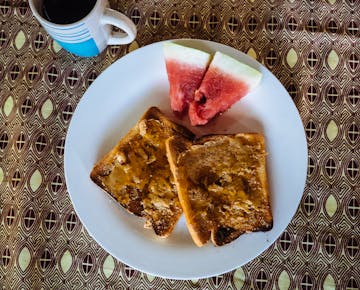



Pricing
Spots are limited. For a Registration Fee of just US$299 (approximately CA$435) you secure your spot and unlock all our preparation and training tools.
You don't need to worry about paying your Program Fee until you get closer to your start date.
Duration |
Program FeeDue 30 days before you start, or within 48 hours if you register inside of 30 days. Covers the cost of hosting you.
|
|---|---|
| 1 week | $610 Equivalent to $87/day |
| 2 weeks | $760 Equivalent to $54/day |
| 3 weeks | $940 Equivalent to $45/day |
| 4 weeks | $1,070 Equivalent to $38/day |
| 5 weeks | $1,220 Equivalent to $35/day |
| 6 weeks | $1,350 Equivalent to $32/day |
| 8 weeks | $1,610 Equivalent to $29/day |
- All programs attract a Registration Fee of US$299 (approximately CA$435) in addition to the Program Fee. This covers all pre-departure support services.
- A 5% international banking fee is added at point of payment.
- Volunteers staying for longer than 4 weeks will need to budget an extra US$400 (approximately) to obtain a temporary work permit from Zambian Immigration in order to stay up to 90 days.
- Recommended spending money: Volunteers in Zambia generally find US$100 per week to be sufficient for expenses.
- Meals
- Airport pick-up
- Return transfers to Livingstone
- US$200 one-off surcharge to cover additional transport, supervision and logistics involved in the project
- Accommodation
- 24/7 in-country emergency support
- In-country program orientation
- Pre-departure support from your Program Manager
- Personalized preparation tools, guides and check lists
- Access to IVHQ’s preferred insurance and flights partners
- Comprehensive in-country day to day support and guidance
- Discounts on travel and tour add-ons
- Certificate of International Volunteer Service
Learn more about what's included in your IVHQ Registration Fee and Program Fee.
- Transport to and from your placement each day
- Return airport transfer when your program finishes
- Flights
- Visa (if required), travel insurance (mandatory), vaccinations, criminal background check.
- Personal spending money for snacks, laundry, public transportation, drinks and leisure activities during your free time.
Popular add-ons & experiences in Livingstone
Take your volunteer experience to the next level with these popular add-ons and experiences. Explore your options below and learn how to book them once you've been accepted onto the IVHQ Livingstone program.
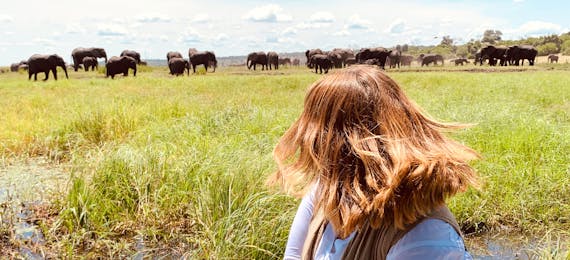
A memorable 2 day safari experience at the Chobe National Park, Botswana, known for its huge elephant herds.

Experience Mosi-Oa-Tunya guided game drives, home of most of Zambia’s white rhino population.

Enjoy a stress-free ride from your accommodation to the airport, organized by the local team.
Check what's required to visit Zambia
Safety and support
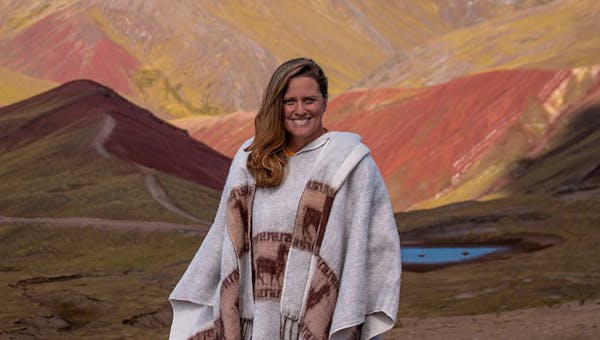
Safety and support
IVHQ follows best practice and industry-leading health and safety procedures, which are regularly reviewed and optimized as part of the B Corporation recertification.
- All volunteers encouraged to complete our interactive pre-departure training.
- All local teams trained on best practice volunteer management & First Aid.
- All IVHQ programs are required to adhere to IVHQ's Risk Management Policy.
- All volunteers have access to 24/7 in-country support from our local team.
Essential country information
Essential country information
| Capital | Lusaka |
| Population | 17.86 million |
| Languages | English, Nyanja, Lozi, Tonga |
| Currency | Zambian Kwacha (ZMW) |
| Time zone | UTC+02:00 |
Weather and climate
There are three seasons in Zambia: the dry season (mid-April to August), when temperatures drop at night, but the landscape is green and lush; the hot season (September to mid-November), when the best time to see wildlife as flora is sparse; and, the wet season (mid-November to mid-April), which is ideal for bird-watching.
What recent volunteers said about their IVHQ experience
Volunteering with IVHQ was the best thing I have ever done. I would repeat my time in Zambia a million times over if I could. I came alone and was initially a little nervous but if I could give any advice to someone hesitant about joining the program I would say just do it! I felt so safe and supported throughout my entire stay.
I wouldn’t hesitate at all with joining this program, it really is a unique experience and the family and the community you stay with are so special. You forget about all the lack of electricity/running water and you just appreciate every little thing. The family I stayed with in the village - just incredible people.
My Program Manager was amazing, and the local team was very helpful - I had a great experience.
To read all reviews, visit our reviews page.









